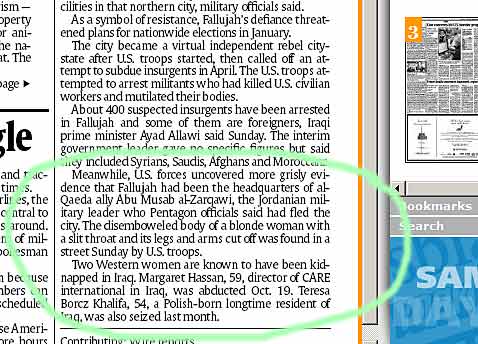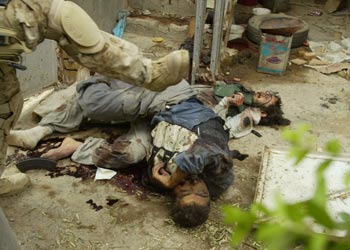5am
I woke up early, my mind filled with Jason Burke's
recent
article about the Islamic fundamentalists' use of video as a very
modern weapon in their war with modernity in general, and the US in
particular.
Nothing particularly problematic in that, except in musing on his
conclusions—that some of the more extreme violence on video coming out
of Iraq was down to status games, competing for who could be the most
extreme—I found myself thinking of what else they could do to be more
extreme. In other words I'd joined them.
I take this as a signal that, however honorable it is to confront the
love of power—so astonisingly, transparently in-your-face present in
the US and its 'coalition of the coerced and the bribed' as
Presidential candidate John Kerry called it, to be in touch with it, to
feel it, to empathize with its victims (and for reasons of
confidentiality there is much else that I can't speak about here)—it
was time to interrupt (not end) this line of inquiry.
Why? I have learned over the last 15 years of trying to
confronting
the lovers of power in the UK psychotherapy community that there
can come a point in which active resistance morphs into resembling,
even reproducing, the object of resistance. In which making a good
piece of resistance, a very honorable thing in my book, we can
unconsciously join the oppressor, and in style if not in content, begin
to reproduce the oppression.
For example, some of the animal rights activists in the UK have moved
across this boundary to a point where elements of their activism
reproduce the violence that they are opposing. Employing domination in
the task of rolling back of domination is a lose- lose strategy that
undermines the rationality of arguments for ending the abuse of animals.
My waking images are a reminder too that the love of power drives out
the power of love. Something being demonstrated daily in Iraq where,
with that lack of innovative ingenuity that seems to be endemic in the
military-minded down the ages, the US forces enacting the removal of a tyrant
are only too visibly deploying the methods of the previous regime,
extremes of state violence, torture and stalinist style news management.
And so in this inquiry, sofar as the love of power topic has driven out
the power of love topic it is time to bring them more into balance.
There are 0 writeback comments for this entry
posted at: 06:40 | permanent link to this entry
Staying on the case
There have been times lately when keeping up this enquiry in the love
of power and the power of love have been emotionally onerous. Last week
was one of them.
I am trying to learn how to take note of events and evidence and not
necessarily to open up each topic. i.e. present them here with
images and links as a way of holding them in memory, as moments, points
in history.
Next week in the UK (November 22-28) is to be
anti-bullying
week. A government supported initiative to applaud, though
the impression could be gained from
this
offical site that
bullying only happens in school. Nevertheless, it's a great start.
Israeli
reprisals. B'Tselem reveals unprecedented scale of
house demolitions in the Occupied Territories
'How long does it
take to demolish a house?
It takes a year to build it. Sometimes a
hundred
years. And there are some houses that have always been there.
How long does it take to demolish a house?
Less time
than is spent thinking about whether it should have been demolished.
How much time is spent thinking about whether to demolish? Less time
than the ring of the phone ordering the demolition.
One shove and its gone. A hole gapes in the
familiar
landscape and the family that had substance and a name and an address
and human beings of all ages and relationships –has in the blink of
an eye become an example…
At night, no one sees where the destroyed
family has
gone. No one knows what they are doing now. And where they are
sitting now – in some corner, uprooted with their possessions,
under heavens empty and heavy, is anything being noted down about
them in some corner there now?'
This extract is from a new report just released by B’Tselem entitled,
"Through
No Fault of
Their Own" revealing that the number of houses demolished as a
punitive
measure in the Occupied Territories is twice as large as Israeli
officials claim. Ostensibly, the demolitions are aimed at Palestinians
who carried out, or were suspected of carrying out, attacks against
Israelis. In practice, the primary victims are family members who are
not suspected of any wrongdoing.
B'Tselem
is the Israeli Information
Center for Human
Rights in the Occupied Territories
Iraqi hostage(s) This was the
week in which Margaret Hassan appears to have been murdered in Iraq.
The emotional low point of the week for me was this item on the front
page of
US Today (14th
October 2004)

and then days of silence in the media when, having heard
there were two known western women hostages in Iraq, Margaret Hassan,
and
Teresa Borcz Khalifa, a Polish woman (who was
freed November 19th), I failed to find any mention of this murder.
Margaret Hassan was not blonde, so who is this woman? A week later I
have still found no reference to her death. And what does the level of
damage
she appears to have suffered tell us about the quicksands of despair
and hate that oppression
can generate?
155mm US Artillery firing on Falluja
155mm
is a little over 6 inches. The US forces were firing into Falluja
apparently from several miles out of town with this weapon. What
possible justification can there be for such indiscriminate
violence?
My concern at the repeated TV news footage of US
artillerymen firing several 155mm rounds a minute was echoed, it turns
out, by
BBC reporter
Paul
Reynolds, who also asked why:
I have questioned many times
senior officers here about the use of heavy weapons because they have
been using 155mm artillery in Falluja, they have been dropping 2,000
pound bombs. The bullets that they fire are high
velocity. The buildings are of poor construction here -
the bullets travel through the walls. And when they see what they
believe to be militants - and these marines are incredibly calm under
fire, they are almost unflinching - they do wait until they see a guy
with a gun but when they see that, they open up with everything they
have got and the question is, how much collateral damage is there going
to be?
Falluja casulties
Yes I know
these pictures from al Jazeera are hard to look at, both feature
children, but there are others
that are worse. And this last week images of the civilian casualties of
the assault on Falluja have been notable by their absence from the
newsmedia I see. Here is an
al
Jazeera report on civilian casulties early in the November
post-election assault on Falluja.


N.B. Despite American and Iraqi provisional government smears and
physical
attacks, Al Jazeera is an ex-BBC outfit that holds a very even-handed
Arab view of events in the Middle East.
US soldiers kill wounded men in
Falluja
The NBC video of US soldiers shooting a wounded rsistance
fighter in Falluja seems to have disappeared but these four frames
from
it...

....convey the casual brutality of men so stressed out by training and
indocrination that they can see defenseless
wounded opponents as 'unmenschen', having 'lives
devoid of
value'... so that, as here inside a mosque, they can kill them.
Here from the blog of Kevin Sites, the freelance cameraman who filmed the shooting, is his
open letter to the marines involved.
Iraqi suicide bombers—who are they?
One of the features of the armed struggle going on in Iraq that seemed
to be entirely invisible to the media I read is the sheer numbers of
people who are prepared to kill themselves in opposing the US attack
and occupation. I haven't counted but it seems like more than one a
day, week in week out.
Is it possible that these men are remnants of
the Saddam Hussein regime? Why kill yourself to bring him back? If not,
how come these men have to wear the label 'insurgents', bought into by
all the media I read. Considering the numbers and frequency of suicide
bombing,
what a strange label, one that seeks to tell us that they are
'outsiders'—not indigenous people so infuriated by the violence of the
US attack and occupation that they are willing to kill themselves to
reverse it?
Perhaps, as other men have down the centuries, including the American
and British
troops occupying their country, they are dying for God and Country.
What else could this many men willing to kill themselves
mean?
As I have written elsewhere here, suicide bombing,
whether
at bus stops, in airliners, or cars, is a weapon that at a stroke
obsoletes the most fancy techno precision weapons of the alienated, if
courageous patriots, of the UK and US military.
Hunting
Yes, domination does sometimes seems to be an immovable a feature of
the
landscape and then, as with hunting, years of courageously indignant
people-pressure win through, and a corner of domination is rolled
back.

Amid bizarre scenes of procedural confusion, the UK Parliament voted
this week to stop the hunting of foxes for fun in the UK.
To appreciate fully why this is significant in the UK, you need to
understand that hunting is a remnant of feudal i.e. fullout baronial
domination, sustained by the rich and powerful in the UK for a thousand
years. The British royal family are blood
sports enthusiasts, and for social climbers and the landed gentry,
hunting has remained a jewel in the crown of the
seigneural/aristocratic tradition.
Hunting, with its ceremonial dress and the blooding of new recruits,
has always seemed to me an archetypal example of dominance in action.
The fight to keep hunting in the UK hides a covert agenda—"hands off
our
hereditary power and wealth".
The fightback, by the House of Lords, initially unsuccessful, will no
doubt be followed by other pressures from the feudal wing of the
Countryside Alliance. Labour's Baroness Mallalieu, who is also
Countryside Alliance president and who led opposition to the Bill to
ban hunting with hounds in the House
of Lords, said the Hunting Bill was "rank bad", adding: "Its
foundations
are naked prejudice and wilful ignorance, it is without rationality and
without principle". Comments that it struck me, apply only too well to
hunting itself.
Palestinian Child Deaths
Figures published 30th October
by
Al Jazeera appear to show that the Israeli
Defense Forces [IDF] are killing an outrageous number of Palestian
children.
In
October 2004, the number of children and minors under 17 killed by the
IDF has
climbed to 33. An Israeli officer, who in
October shot a 12-year-old Palestinian child
in Rafah in southern Gaza 20 times to ascertain that she was dead, was
arrested briefly but only on
suspicion that he lied about the incident.
Many, or most, Palestinian children killed have been on their way to
school or have been have been imprudently stoning the Caterpillar
Inc. bulldozers that demolish their homes.


There are 0 writeback comments for this entry
posted at: 08:08 | permanent link to this entry
God invades White House
'... surveys have shown, that many more Americans
believe in the
Virgin Birth than in Darwin's theory of evolution.' The
Day the Enlightenment Went Out By GARRY WILLS nytimes.com/2004/11/04/
The 2004 US Presidential election has seemed to have obvious relevance
for
this
inquiry into love, and its antithesis, domination. I've already made
three tries to find
a voice that is up to the task of
writing about it. They all ran into the sand. Too
reasonable. Too even-handed for the amount of feeling that I and lots
of other people had running, both before and after the US election.
1. Satanic
Theology
For months past I've been digging into what various people have had to
say about fundamentalism,
an
article by Karen Armstrong, her book,
The Battle for God, and Almond,
Appleby and Sivana's summary volume,
Strong
Religion of a huge, 10-year, US funded, research study into
fundamentalism
world-wide, that
includes details of the origins of such groups across America.
Here are some headlines.
World-conqueror
In the
world-conqueror pattern we see the most
virulent type of
fundamentalist movement in terms of the disruption of a previous order.
....The world, a realm of Satan
and
darkness, must be overcome if not brought back into the fold. Its
institutions,
structures, and values must be brought under the control of the true
believers. Strong Religion p151
Rolling back Secular Humanism
[In the US] The
shift
to an
operative
postmillennialism—the
belief that Jesus would
come only after Bible-believing Christians had prepared the way by
inaugurating the era of righteousness on earth—was triggered by the
moral and
social crises of the 1960s. ... Bible-believers could no longer wait
passively for Jesus
but must protect the next generation of Christians by concerted
political efforts to "repeal" or "roll back" secular humanism...
...Falwell
and his associates in the Religious Roundtable
and other Christian Right lobbying groups pushed Protestant
fundamentalism toward a new, world-conquering pattern of political
activism in
reaction to the threatening pluralism of belief and lifestyle that
appeared to be
overtaking "Judeo-Christian" America. Strong
Religion p156
Theocratic politics
The first wave of
this new
political activism, designed to "take back"
the courts, schools, and Congress from the secular humanists (and,
presumably, to vanquish them or at least diminish their role in public
life),
was active during the Reagan presidency and followed a strategy of
applying
pressure at a national level. A second wave, inaugurated by the
Reverend Pat Robertson's Christian Coalition in the late 1980s and
1990s,
profited from the lessons of the Moral Majority era and focused its
impressive and far more successful political activism on local
politics—state
assemblies, school boards, state political parties. Strong
Religion p156
A bid for power
The growing conviction of Jerry
Falwell,
Pat Robertson, Randall Terry, and Tim LaHaye in the late seventies as
to the possible
emergence of a Moral Majority, likely to acquire hegemony in American
politics and
culture, made them introduce a "postmillennial window"' into their
premillennialism. They assumed that the arrival of the millennium
depended upon their activism. Tribulation would precede Rapture, not
follow it.
In consequence, one should act immediately in order to better American
society, otherwise devastation would be so comprehensive as to hit the
saved as well, and anyhow, it might be so cataclysmic as to render
reconstruction extremely difficult. Only a daring bid for power, until
then thought to
be an un-Christian course of action, could save the day. Strong
Religion p70
After sifting what felt like a small galaxy of stuff on fundamentalism represented
here by these quotes and my
earlier article, I
realized
why I, and a lot of other people, not least the liberal-leaning inhabitants
of
the US, were so wound up about the 2004
US Presidential election result. It seemed
to point to a threshold being crossed:
As Sister Joan Chittister OSB writing of the 2004 Presidential
election puts it.
I would call it a warning, a
signal of things to come, the
klaxon of what is clearly a crossover moment in time, perhaps, but not
a real profile of the historic American character and hopes....
...we did not, in this particular
political exercise, see the
fundamental ideals of the American public -- respect for differences,
separation of church and state, the common good, and justice for all --
in full sway. We did see ideology at its most punishing, smothering and
narrow worst.
...what we saw is what extremism
looks like, what cultural
evolution looks like, what fear looks like, what religion run amuck
looks like. We saw radical right fundamentalist religion pitted against
the most shameless definitions of secular liberalism as weak, immoral
and irresponsible. It was the battle of two one-eyed monsters writ
large. No nuances. No common ground. No common sense. No real
evidence.
Joan Chittister, OSB
God invades
White House
2. Enough of facts - my mind is made up
The 2004 US Presidential election result appeared to show that
since 9/11 a majority of the
American people have bought
into a patriotic loyalty oath promoted by the US administration. One
that entails believing in a '"war"
on
terrorism'; Iraqi possession of 'weapons of mass destruction';
Iraq as a complicit in the 9/11
attacks; and calling the attack on Iraq a "war". Aren't these fictions?
Aren't they blatant pieces of trance
induction intended to consolidate the power of the Bush administration
through further terrifying the
American
population and marginalizing and denying
dissent?
The Power of Nightmares,
the BBC2 series by Adam Curtis, (
video
Part 1, Part 2,
Part 3)
offered
almost three hours of
video evidence that this was a plausible explanation. If so, how come
so many
people signed up to
this apparent failure of common-sense?
And then I remembered that the fundamentalism studies had shown that many millions of committed
church-goers in the US, perhaps 30% of the population, live within the
'enclaves' of a variety of forms of christian
fundamentalism. Through owning and controlling churches, schools, home
schooling, colleges, publishing, broadcasting, and in
some areas, even shopping, the enclaves seek
to be self sufficient. What I hadn't appreciated was that such enclaves
are a way of ensuring
that people of faith are actively
out of touch with other ways of being in the world. The
enclave is a vessel of faith, of righteousness, and the
god-less outside world is perceived as 'bad', even 'evil', to be
avoided. Political
choices within this cultural deafness filter down through charismatic,
male,
authoritarian,
local or national religious leaders, and are re-enforced by a vast
christian media
network.
Ostensibly such enclaves,
a key element of
fundamentalism everywhere, are defending themselves from
the moral
decay
of pornography, sexual freedom, political correctness, gay
rights,
feminism and the free-wheeling liberal critiques of secular
institutions such as governments, universities, science and
publishing. A closer look suggests that christian resistance to being
over-run by liberal values has
less to do with a perception of moral disintegration, and much more to
do with holding on tight to
a short list of the
specific moral values that they have selected from the Christian story
book;
especially patriarchal
male
dominance, the
subordination
of women
and the un-naturalness of homosexuality, and alongside these, the idea
that the nature is a resource to be exploited.
The 2004 US Presidential election appears to have been won as this BBC
report confirms, on the basis
of
large
numbers of christian conservative voters seeing George W. Bush as
embodying these selected
'moral values'.
God invades
White House
3. Unpicking the power of
righteousness
In the task of understanding the 2004 US presidential election
result, research into the moral values of
christian fundamentalism has been vital. What
feeds and sustains such values? Yet another strand of American
research, this time by cognitive
scientist and linguist George Lakoff, shows
how
notions such
as 'moral values' are human
constructions, rooted in the human capacity for metaphor:
Moral order is based on a folk
theory of the natural order: The
natural order is the order of dominance that occurs in the world...
God is naturally more powerful than people
People are naturally more powerful than animals, plants and
natural
objects
Adults are naturally more powerful than children
Men are naturally more powerful than women. Lakoff Moral Politics p81
The consequences of the metaphor
of moral order are enormous,
even outside religion. It legitimates a certain class of existing power
relations as being natural and therefore moral, and thus makes social
movements like feminism appear unnatural and therefor counter to the
moral order.It legitimates certain views of nature, e. g., nature as a
resource for human use, man as steward over nature. Accordingly it
delegitimizes other views of nature, e.g., those in which nature has
inherent value. Lakoff Moral Politics p82
In addition [the
metaphor of moral order]
focuses attention on questions of natural superiority...
there are people (typically wealthy people) who believe that the rich
are morally superior to the poor. Indeed that belief is explicit in
forms of Calvinism, where worldly goods are a reflection of
righteousness. Lakoff Moral
Politics p83
Might
the
heightened awareness and level of feeling that many people have about
the
2004 US
Presidential election amount to some intuition that
we are living through
a critical point in history. One where the "morally superior" rich of
America, led by a
charismatic (and Calvinist) leader, license themselves to further
institutionalize a belief in the equivalence of righteousness
and wealth? Have we reached a
threshold where
we
realize, to our horror, that the Bush administration is leaving behind
secular,
liberal plurality; leaving behind justice,
negotiation, and the rule of law;
and is intent on installing a 'Kingdom
of the God-fearing'?
I'm reminded of a New Yorker
cartoon where, as Adam and Eve
disport themselves in the Garden of Eden, the hand of God, waving a
warning finger, reaches out from the heavens, and a voice declaims,
"Rule No:1
don't piss me off". This seems to epitomize
the Bush administration style. Well hidden
behind often Orwellian language (The "Clear
Skies Act 2003" licenses industry to pollute - The"Healthy Forests
Initiative"
licences the damaging clear-cutting of forests) are the
god-given absolutes of biblical
inerrancy. These highly selective fear-laden fragments of the Christian
story cascade down through layer on layer of authoritarian,
patriarchal, (and usually male) leaders, to
terrify other,
subordinate creatures, and
thus much of the rest of the
world, into compliance with American interests.
God
invades White House
4. Holding the Big
Picture
Was the distress many of us felt
about the Bush re-election due to it seeming to threaten the
negation of so many of the socially vital gains of recent decades?
Or as I fancy, is it more a matter of two
steps forward, one step back?
Am I taking refuge here in
ungrounded optimism, some resuscitation of the much derided
notion of 'progress'? Perhaps, but I am old enough to have seen a
major
over-arching development in recent decades—the
evolution in attitudes to childcare. Childcare has moved away
from the fear-filled
alienation of authoritarian control—toward nurturance and
gentleness—meeting the child's needs rather than controlling their
behavior, (the UK, trailing other
European nations, is even legislating to criminalize
smacking children).
Along side this in the last 30 years I have seen the
gradual emergence into
public consciousness of child abuse,
neglect,
bullying, paedophilia,
and
domestic
violence.
All of which
amounts to a raising of consciousness about
domination, albeit haphazard and fragmentary, and often highly
contested. But I have the sense, looking at the 'big picture', that
history is inexorably moving in this direction,
If you are skeptical, I recommend Lloyd de Mause's History
of
Childhood, which shows extremely convincingly the
historical
trajectory from astonishingly abusive
parenting, toward more
caring, more loving, more child-centered approaches to upbringing and
child-care. With, as a likely consequence, the moderation and/or
marginalizing of
domination. Locally it can be hard to see but
generationally it seems to be a notion that has legs.
God invades
White House
5. The politics of
identity demolition
De Mause's psychohistorical approach
has been complemented
by George Lakoff's notion of two divergent parenting styles that he
details in Moral Politics,
see this article for
a brief account. He calls
them 'Strict Father' parenting and 'Nurturant' parenting, and
he equates these with a
conservative and liberal politics that correspond to each parenting
style.
Christian
and islamic
fundamentalism both appear to to
enthusiastically
endorse 'Strict Father' parenting i.e. patriarchy.
Here
are a couple of
items from a modern (1972) christian child-rearing manual:
The spanking should be
administered firmly. It should be painful and it should last
until the child's will is broken. It should last until the child is
crying, not tears of anger, but tears of a broken will. As long as he
is stiff, grits his teeth, holds on to his own will, the spanking
should continue. (Hyles, How to rear
Children pp99-100 in Lakoff: Moral
politics)
Obedience is the most necessary
ingredient to be required from the
child. This is especially true for a girl, for she must be obedient all
her life. The boy who is obedient to his mother and father will some
day become the head of the home; not so for the girl. Whereas the boy
is being trained to be a leader, the girl is being trained to be a
follower. Hence, obedience is far more important to her, for she must
some day transfer it from her parents to her husband. . . .
This means that she should never
be allowed to argue at all. She should
become submissive and obedient. She must obey immediately, without
question, and without argument. The parents who require this have done
a big favor for their future son-in-law. (Hyles, How to rear Children p158
in Lakoff: Moral politics)
Such 'Strict Father' parenting naturalizes domination and
subordination,
and as Lakoff shows in this
article, it shapes conservative
political beliefs in the US.
My guess is that part of the considerable distress and alarm that
many people such as myself have felt around the re-election of
President Bush, is
that it signals a move toward the
consolidation, and even extension, of the
'shock and awe' of America's 'full
spectrum dominance', at home and abroad, 'strict father' politics.
However, as the 'strict father' approach to childcare gives way to a
more 'nurturant' approach, many people sense
intuitively that
the expressions of ('strict father') 'family and moral values' that
shape the Bush Presidency are
facing
backwards in history.
They are in regression from a secular plurality
where, unencumbered by patriarchal theology, a rich variety of social
movements such as feminism, minority rights, gay rights, abortion
rights,
racial justice, innovative spiritualities, and ecological
awareness, have gained legislative and popular recognition. What these
movements have in common is that they roll back the 'folk theory' of
the naturalness of domination, especially male domination, perhaps
most effectively and essentially, in child-care.
And on the other side of the coin, exactly
these developments appear to be
anathema to fundamentalist christian church-goers.
Fundamentalist enclaves see these secular expressions of 'modernity',
or
as I would fancy 'post-modernity', as a revolt against God. And if you
are a person of faith, who "bears witness", "walks with the Lord", "is
busy harvesting souls", or "excising the cancer of deviation,
sexual
or otherwise", a revolt against God is the ultimate challenge. Why?
Because it threatens identity demolition. Faith, like the optimism in
this text, is an investment in a big idea, a "Yes". If
significant doubt arises,
such a 'Yes', can
morph into a "No".
If your whole identity is invested in the "Yes" of christian
or other fundamentalism,
based on the
inerrancy of biblical texts, then
de-construction or
questioning of this faith has to be strenuously resisted. After
all, none us want to 'go out of our minds'.
God invades
White House
6. Echoes and
resonances
For US christian conservatives, the secular values of plurality,
diversity, negotiation and power-sharing do realistically threaten
identity demolition.
American christian enclaves have reacted to these
perceived
challenges
to their faith with
the classic characteristics of fundamentalism world-wide. They have selected scriptural items that
support the present controversies while neglecting others, adopted moral manicheanism, signed up to absolutism and inerrancy, and framed the struggle
as
millennialism, the end of
history.
Selectivity
Protestant
fundamentalists of the United States select the
apocalyptic prophesies to be found in the books of Daniel and
Revelation... p94
...fundamentalism selects some aspects
of modernity to
affirm and embrace. Much of modern science may be accepted, for
example, and modern technology such as radio, television, VCR's
audiocassette tapes, telephone banks, and modern mailing techniques are
effectively employed. p95
...fundamentalisms select
certain consequence or processes of modernity and single these out for
special attention, usually in the form of focused opposition...
abortion in demand in the United States. p95
Moral Manicheanism
A
dualistic or Manichean worldview is one in which reality is
considered to be uncompromisingly divided into light, which is
identified with the world of the spirit and of the good, and darkness,
which is identified
with matter and evil. Ultimately, light will triumph over darkness. For
fundamentalist movements, as we have noted, the world outside is
contaminated, sinful,
doomed; the world inside is a
pure and redeemed "remnant." p95
Absolutism and Inerrancy
Fundamentalists...
share a recognizable approach to
religious sources. First, they steadfastly oppose... ...the
canons
of critical rationality as defined by outsiders. Instead of following
philological
or historical methods, fundamentalists employ their own distinctive
strategies of interpretation, including "hardened" and "updated"
traditional
approaches, designed in part to reify and preserve the absolutist
character of the
sacred text or tradition. p96
Millennialism and Messianism
History
has a miraculous culmination. The good will triumph over
evil, immortality over mortality; the reign of eternal justice will
terminate
history. The end of days, preceded by trials and tribulations, will be
ushered
in by the Messiah, the saviour.
Do you find echoes and resonances between the
2004 US presidential election and these
headlines from the
ten year study of fundamentalism
around the world
into
christian fundamentalism? Here are some further
quotes
from that study
that may account for the sense of urgency that has energized the
christian right
in recent years.
American
fundamentalists see the United States as the third
concentric circle of their "moral landscape," beyond their own
independent church and the loose network of churches to which they
belong (Baptist Convention, Liberty University graduates, etc.).
America is of course endowed
with a theological dimension (as the City on the Hill),... ...The fourth
concentric circle is the Middle East, with the Holy Land as
its hub and the war theater of the Apocalypse. The prophetic landscape
depicted
in the Books of Ezekiel, Daniel, and Revelation saw its veracity
confirmed
by the strategic role of the Middle East in the international arena
over
the last quarter century. Cosmology has suddenly been endowed with a
down-to-earth significance. (106) Strong
Religion P73
Often, as noted above, the
movement
really gets off the ground only when a cataclysmic, transformative
event
occurs either within the movement itself or, more likely, in the local,
national, or international environment external to the movement. The
trigger creates
a new set of circumstances that provides an opening for a
fundamentalist movement to expand and assert itself under the guidance
of a
charismatic authoritarian leader." Strong Religion p135
God invades
White House
7.
Death of the American dream of
invulnerability
Initially
I bought into the trance induction
of accepting the appalling 9/11
damage as an unprovoked attack on the US by Islamic
terrorists.
That was how it looked. And
then, as
day by day the media built up the posture, constantly reinforced by the
Bush administration,
that the
US was an entirely innocent victim,
the
trance bubble popped. as
though US complicity with oppressive authoritarian regimes in
Egypt, Iraq, Saudi Arabia, Iran and Israelestine were not part of the
historical record. A
huge store of goodwill was
sacrificed.
Then followed the acting out of revenge on
Afghanistan, one of the poorest countries on earth—and so recently an
ally against a previous 'evil empire'—the
USSR (check
out Stallone's Rambo 3 for
details) and not long after, the illegal attack on Iraq. In a massive betrayal of trust,
the
Bush US administration followed, and
later (Iraq) exploited, a political need to rationalize
the newly exposed vulnerability of the US and justify vengeance. Rarely
in
history can 'persecutor' have reversed into 'victim' and back to
persecutor so quickly,
From the perspective of several years on, 9/11 looks like an incident
in
a war of attrition between fundamentalist ideologies, christian and
islamic, that has been going on since at
least the
Iranian hostage
crisis and Beirut bombings. The two ideologies seem to have much in
common, not least profoundly
misconstruing each other. Islamists see the US as the epitome of a
satanic modernity that is a threat to the Koran based culture.
Since
9/11, the
US
has behaved as though the
modern
methods of fundamentalist islamists such as Osama bin Laden and al
Queda posed a
critical challenge to the US world hegemony. As though the overwhelming
asymmetry of
wealth and resources didn't exist.
I have to keep reminding myself
that fundamentalism is archaic only in it's beliefs, in its
methods it is typically highly innovative and indeed persons willing to
kill themselves, and thus make routine objects such as home videos, cars and planes
into very lethal weapons, are very modern form of weaponry.
So, following 9/11, in the US and al Queda, we
appear to have two opposed fundamentalisms each out to undermine or
destroy the 'modernity' of the other.
However if we pop the trance bubble of feeling equally terrified of
both of
them, what we see is a gigantic
asymmetry, the stupendous technological power and might of the world's
only
superpower
severely challenged by the strikingly modern innovations of al
Queda's networked autonomous cells and
suicide bombers. But, as I have learned to appreciate,
(see BBC2 The Power
of Nightmares
video
Part 1, Part 2,
Part 3)
while
undoubtedly
posing some risk,
the
fear of an Al Queda attack has been hugely
inflated
for
political reasons
by
the US and British administrations.
It is not difficult to see how the US would
see such critical innovations
as suicide bombers as doubly threatening, because
ultimately
there is no secure
defense
against them, thus key aspects of US
technological
might
are
rendered obsolete
overnight. And of course it is not only the opposed
forces that are asymmetrical, the level of damage, however painful to
us,
in New York, Madrid, Bali and Morocco, is as nothing caused by the
generational damage wreaked by the US,
think Philippines, Vietnam, South America, Palestine, Iran, or Saudi
Arabia.
And yet, was there not always the option, as the UK (IRA) and Spain
(ETA) have
seen,
of refusing to buy into the fundamentalist (terrorizing) trance of
9/11? Of
seeing these as damaging
actions of dissidents, a (major) nuisance, but part of the price of
democracy; of choosing to respond by asking, 'Why us?'. 'Why now?'. Why
couldn't the US administration do this?
God invades
White House
8. Rolling Back
Modernity
For US
christian
conservatism, 9/11 provided both a
confirmation of its apocalyptic visions
and a priceless window of opportunity. Both of these fed the
unprecedented vigor of the
2004 presidential election campaigns in which—as
Esther Kaplan details in With
God on
Their Side— through
America's
born again, Calvinist leader,
George W. Bush,
christian
fundamentalism continued
its invasion of the agenda of the US administration. Their
intention, as I hope may already be clear—rolling back
modernity; at home, liberal modernity, abroad, islamic modernity.
Putting god in the White House.
So what is this liberal modernity that the US christian enclave
(strictly
speaking this
should be plural) feels so threatened by? A
rich variety of legal assertions of human rights and the
criminalizing of sexual and racial
discrimination—not to mention
animal
rights—that have made their way on to the statute books.
Liberal modernity
favours tolerance,
mutual support, cooperation, the right to
dispose of our bodies, especially if we are women; to share power, to
negotiate, to live within the law, to honor the public and the private
universes, to help the needy, to honor dissent? A list that even Jesus
might endorse, were He around to be asked.
Darwin and DNA
The pre-modern narratives of
christian enclaves have no place for the sheer plurality of
modernity—astrophysics, molecular biology,
sociology, psychology, evolution
and stem cell research. But as it seems to me,
what will ultimately consign christian fundamentalism to the history
books lies in
the spiritual, political and psychological de-construction of
our folk theories of reality—the post-modern universe—that shows the
extent to which all such stories are humanly constructed. And parallel
with this—the generation
of new spiritualities that are outside patriarchy, that favor
authenticity and open-ness and that honor the sacredness, the
intrinsic value, of
all life.
Perhaps ultimately what traumatizes, and thus petrifies the
fundamentalist imagination, is an awareness that, running through all
these lines of post-modernity is a core human discovery, transparent
and dramatically fruitful in physics for decades; that what we see, and
the knowledge we generate, is shaped by who is
looking. And the more intensively we
look into nature, the more there is to find, and the more what we find
echoes who
we are. A paradox from which there
is
no escape, nor is there need for one.
And just as threatening to the fundamentalist christian sensibility,
post modernity tell us about process,
reflexivity, emotionality, nurturance, metaphor, transference and so on.
Above all it tells us
about power,
its nuances and its ubiquity. It shows us that just as there is no
escape from our personal constructions of reality, so there is no space
that is free from power relations. And as power thus deconstructed
comes out in into the light of day, the inequities and injustices of
its
distribution in the world come into sharp focus. And nowhere is
power thus rendered transparent, more visible, than in relations
between parents and between them and their children. And so we arrive
again at the feminist critique of patriarchy, of male dominance. In the
new
narratives of sexuality,
intimacy and power, to quote the title of
recent book, power is not
biologically determined but is a matter of
negotiation.
And this I believe, is ultimately what is indigestible for the
christian and conservative right in the US. Understandably, because for
many believers, many people of faith, to acknowledge, let alone
embrace, the discoveries of
post-modernity would, as I have mentioned earlier, be tantamount to
identity demolition.
The 2004 Presidential
election generated a lot
of heat,
not only in the US. This I feel was due to the correct perception that
it involved a sharp confrontation between such divergent approaches to
power. For
the moment,
in
electing George W. Bush,
the conservative christian right,
have succeeded in forging a shield against the intrusions of modernity
that they feel so much pollute and demean the purity of the Christian
message. They succeeded in overwhelming the constituencies of people
who value a
post-modern approach to spirituality, one that supposes multiple
stories
rather than the single Big Idea of the Christian narrative.
However, the jury is out on whether they have defeated the post-modern
narratives of plurality and power-sharing, or whether the Bush
Presidency will prove to be a nightmare from which the world will one
day awaken, a
dream that will
eventually implode, more than likely economically, or due to the
wounds from a
deepening, self-created, Middle Eastern crisis—as the Bush
administration
continues to
insist on crashing
America into
the world.
Lastly and not least, there is a sense in which the US polity behaves
as if the whole of psychology did not exist. As though for 100 years,
and
especially the last 50 years, not least in the US, there has been a
wonderful flourishing of psychological knowledge about group,
inter-personal intra-psychic and social relations.
And
I guess... psychology
is one the core sticking points for the vast
majority of the christian right,
since it is built around the notion
of 'process', of 'reflexivity', of becoming aware of how we do what we
do, of the context
and antecedents of our actions, of becoming competent emotionally,
of
being able to investigate and integrate the shadowy reaches of our
identity and re-evaluate, re-create, and
regenerate, aspects of
ourselves that are over- or under-endowed. So far as we
become even a little bit aware of 'process', we will be likely to to
notice when someone is attempting to entrance us. We'll be better able to
see through and out the other side of a religiosity that
functions as a kind of exclusive (and excluding) loyalty oath, that
disallows
choice and dissent, and, through denying the
Christian message of love and tolerance,
legitimates violence.
God invades White House
9. Postscript
This attempt to compost the
distress deriving from the 2004 US
Presidential election and the culture of domination that sustains it,
has lifted some of the bad emotional weather it generated. But I am
left
with a
troubling outcome to this line of inquiry.
Because they are often structured round a few
unifying, faith-based Big Ideas—
patriarchy,
or male
dominance—christian
conservative
groups seem more able than liberals
to agree on campaign strategies that favour a
narrow range of issues with which large populations can identify. Media
coverage that repeats such notions ad
infinitum through
interviews, photo-opportunities and commercials, amounts
to trance induction, and such spellbinding promises of 'security'
in the face of the inflated threats of a
'war on terror', can come to dominate political
discourse, as they did in the 2004 Presidential election.
If,
by
contrast, you favor a paradigm of human
relations that values diversity, plurality, nurturance, equality and
empathy, these generate multiple messages, multiple meanings, multiple
aims, that can seem incoherent en masse (though not necessarily
locally).
Politically this seems to me very problematic. How do liberal ideas hold their place in the world without compromising their
diversity?
So a key ongoing element of this inquiry into domination is how to
resolve this
dilemma. How can we create institutions, descriptions, naming,
metaphors, and symbols, that hold true to notions
of
plurality, authenticity, nurturance, empathy, caring and love? So that they hold their value in contests where a handful of big ideas shaped by covert notions of absolute truth are used to sustain and regenerate control and dominance.
There are 0 writeback comments for this entry
posted at: 07:59 | permanent link to this entry






